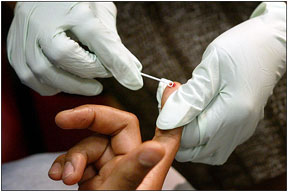 Sexual risk lower among U.S. gay and bisexual men who accurately know their HIV status
Sexual risk lower among U.S. gay and bisexual men who accurately know their HIV status
A new analysis of data from 20 major U.S. cities reveals continued signs of sexual risk among gay and bisexual men, but shows dramatically lower sexual risk among those who accurately know their HIV status. The findings were published today in CDC’s Morbidity and Mortality Weekly Report. In 2011, 33 percent of HIV-positive men who have sex with men (MSM) who were unaware of their infection had unprotected anal sex with someone they believed was HIV-negative or whose status they did not know. However, men who accurately knew they were HIV positive were 60 percent less likely to report recent unprotected anal sex with someone of a different HIV status — with 13 percent reporting this behavior.
Today’s report provides an important look at sexual risk within a population hard-hit by HIV across the United States. MSM account for nearly two-thirds of new HIV infections and approximately half of the 1.1 million people nationwide living with HIV. The number of HIV infections has increased annually among MSM in recent years, particularly in young men.
The new analysis reports on data from CDC’s National HIV Behavioral Surveillance System, which monitors HIV testing, prevalence, risk behaviors, and access to prevention services among at-risk populations in 20 U.S. cities with a high AIDS burden.
The report also provides an analysis of sexual risk over time, finding that the percentage of MSM reporting unprotected anal sex at least once during the past 12 months grew to 57 percent in 2011 from 48 percent in 2005. While the analysis does not provide information on whether other prevention strategies were being employed, the trend is concerning given the high risk of HIV transmission during anal sex.”
While we remain concerned about potentially increasing levels of sexual risk, it is encouraging to see that risk is substantially lower in those who know they have HIV,” said CDC Director Tom Frieden, M.D., M.P.H. “HIV testing remains one of our most powerful tools to reverse the epidemic. Everyone should know their HIV status.”
The dramatic reductions in risk among those accurately aware of their status underscore the value of testing, however, 33 percent of MSM overall reported not being tested within the past 12 months. The data suggest that some men may benefit from more frequent testing. Among those tested within the past 12 months, 5 percent of men who reported being negative or not knowing their status were found to be positive as they were tested as part of the survey. The percentage of men who did not accurately know their status dropped depending on how recently they were tested. Among those who had tested negative seven to 12 months earlier, 7 percent were found to be infected at the time of the survey, compared with 4 percent among those tested in the past three months.”
More HIV prevention strategies are available now than ever before,” said Jonathan Mermin, M.D., M.P.H., Director of the National Center for HIV/AIDS, Viral Hepatitis, STD, and TB Prevention at CDC. “However, these findings are a stark reminder that we cannot afford to undervalue HIV testing. Getting an HIV test at least once a year is essential for gay and bisexual men. Only when a man knows his status can he make the best prevention choices for himself and his partners.”
The range of proven HIV prevention options for MSM has expanded in recent years thanks to advances in HIV prevention research. In addition to recognized prevention methods — reducing the number of sexual partners, using condoms consistently and correctly, and engaging in lower risk sexual behaviors — several new prevention options can significantly reduce the risk of HIV transmission and acquisition. For example, among people infected with HIV, early initiation of antiretroviral therapy can significantly reduce the risk of transmitting HIV to partners. In addition, for some MSM who are HIV-negative but at high-risk, a daily dose of medication used to treat HIV infection (known as pre-exposure prophylaxis, or PrEP) can reduce the chances of becoming infected. Since no single strategy will provide complete protection, multiple approaches will be needed to reduce new HIV infections.
Preventing HIV among gay and bisexual men is a top priority for CDC, as well as a key component of the National HIV/AIDS Strategy. Through its High Impact Prevention strategy, CDC is working to ensure that resources are directed to prevention activities which will have the greatest impact in reducing HIV infections among gay and bisexual men, including HIV testing efforts.More information is available at www.cdc.gov/nchhstp/newsroom.
